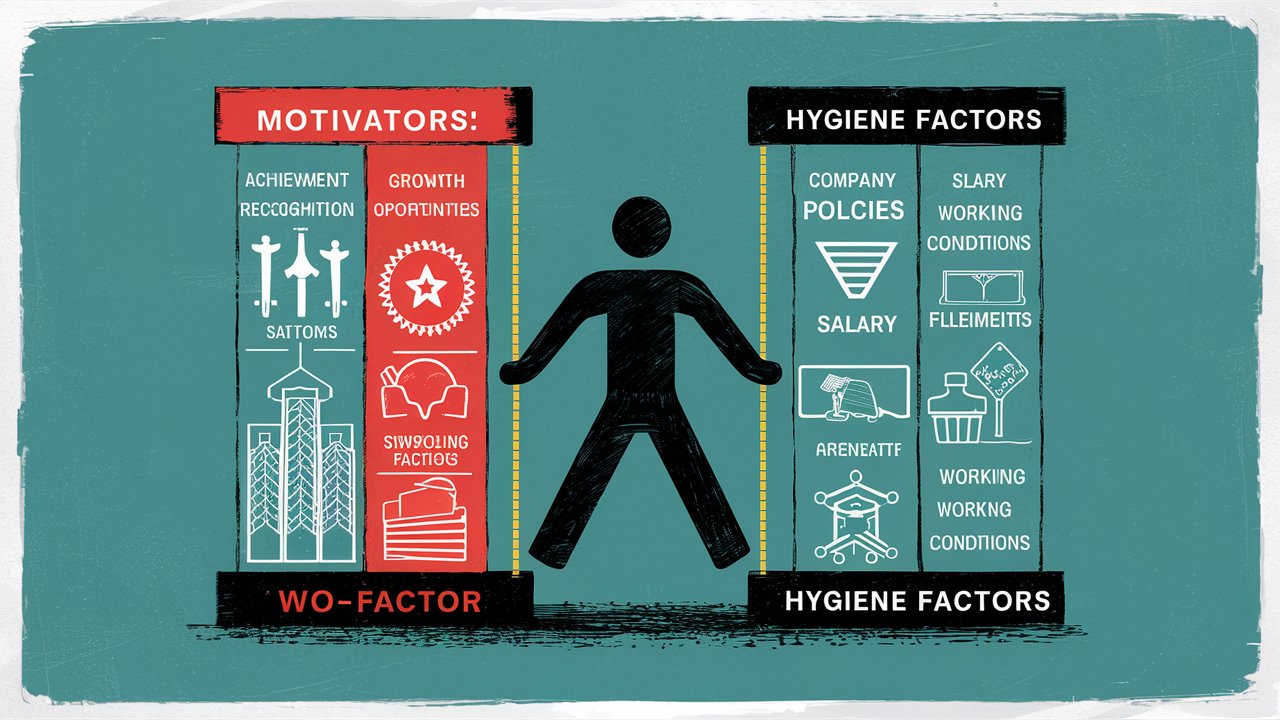Herzberg's Two-Factor Theory is a way to understand what makes people happy or unhappy at work. Let's break it down into simple parts:
Two Factors:
- Hygiene Factors
- Motivators
Hygiene Factors:
These are the things that can make you unhappy if they're not right. But if they are right, they don't necessarily make you super happy. It's like having clean clothes – if your clothes are dirty, you're unhappy. If they're clean, you're not super happy, just okay. In a job, hygiene factors include:
- Salary (how much you get paid)
- Work conditions (like if your office is too hot or too cold)
- Company policies (rules you have to follow)
- Relationships with coworkers (how well you get along with the people you work with)
- Job security (feeling safe that you won't lose your job)
Motivators:
These are the things that actually make you happy and satisfied with your job. They're like your favorite hobbies – they make you feel excited and proud. In a job, motivators include:
- Achievement (doing something well and feeling proud)
- Recognition (getting praised or rewarded for your work)
- Work itself (enjoying the tasks you do)
- Responsibility (having important duties and being trusted)
- Advancement (getting promoted or taking on new challenges)
- Growth (learning new things and developing skills)
How it works:
- Hygiene Factors: If these are bad, you're unhappy. If they're good, you're not unhappy, but you're not super happy either.
- Motivators: These are what make you actually happy and satisfied at work.
Example:
Imagine you're in school. If the classroom is dirty (bad hygiene factor), you won't like being there. But if the classroom is clean (good hygiene factor), you won't be unhappy, but it doesn't make you love school.
Now, if you get a gold star for doing well on a test (motivator), that makes you really happy and excited to do well again.
So, Herzberg's idea is that to make people really enjoy their jobs, you need to fix the hygiene factors first so they're not unhappy. Then, add motivators to make them truly happy and motivated.
Herzberg's theory doesn't explicitly rank hygiene factors from highest to lowest importance because the importance of each factor can vary depending on the individual and the specific job situation. However, based on general workplace studies and common experiences, here's a typical way people might prioritize hygiene factors, from most to least important:
- Salary: Getting paid a fair amount for the work you do is often seen as the most crucial hygiene factor.
- Job Security: Knowing that you won't suddenly lose your job is very important for feeling safe and stable.
- Work Conditions: Having a comfortable and safe place to work, with necessary equipment and a good environment.
- Company Policies: Clear, fair, and consistent rules and policies help create a stable and predictable work environment.
- Relationship with Supervisors: Good communication and support from your boss are important for feeling valued and understood.
- Relationship with Coworkers: Getting along with the people you work with can make a big difference in your daily happiness.
- Status: Feeling that your job is respected and that you have a certain level of prestige or recognition within the company.
- Personal Life: Being able to balance work with your personal life and having time for family and hobbies.
This is a general guide and might not apply to everyone in the same way. Different people might rank these factors differently based on their personal values and work experiences.